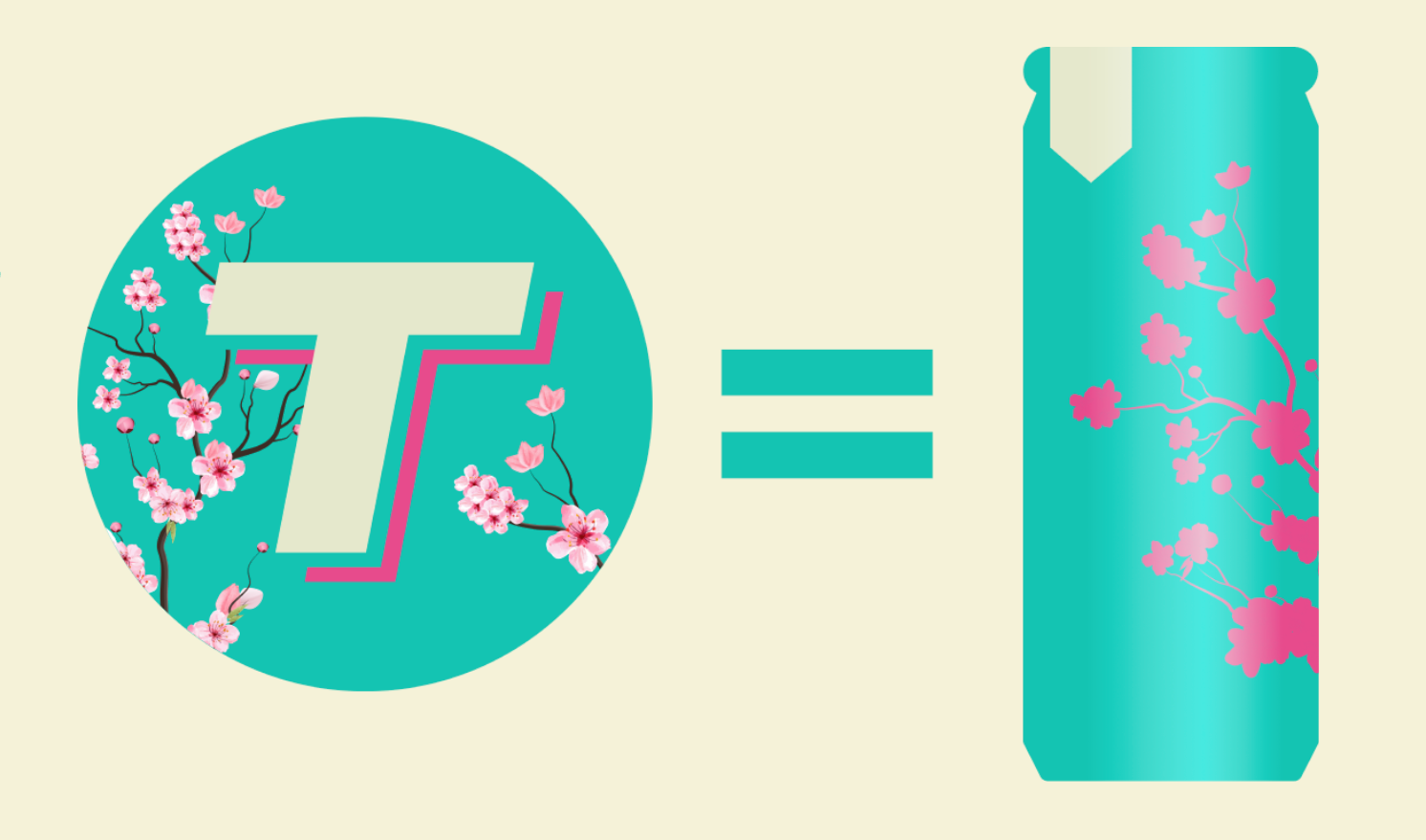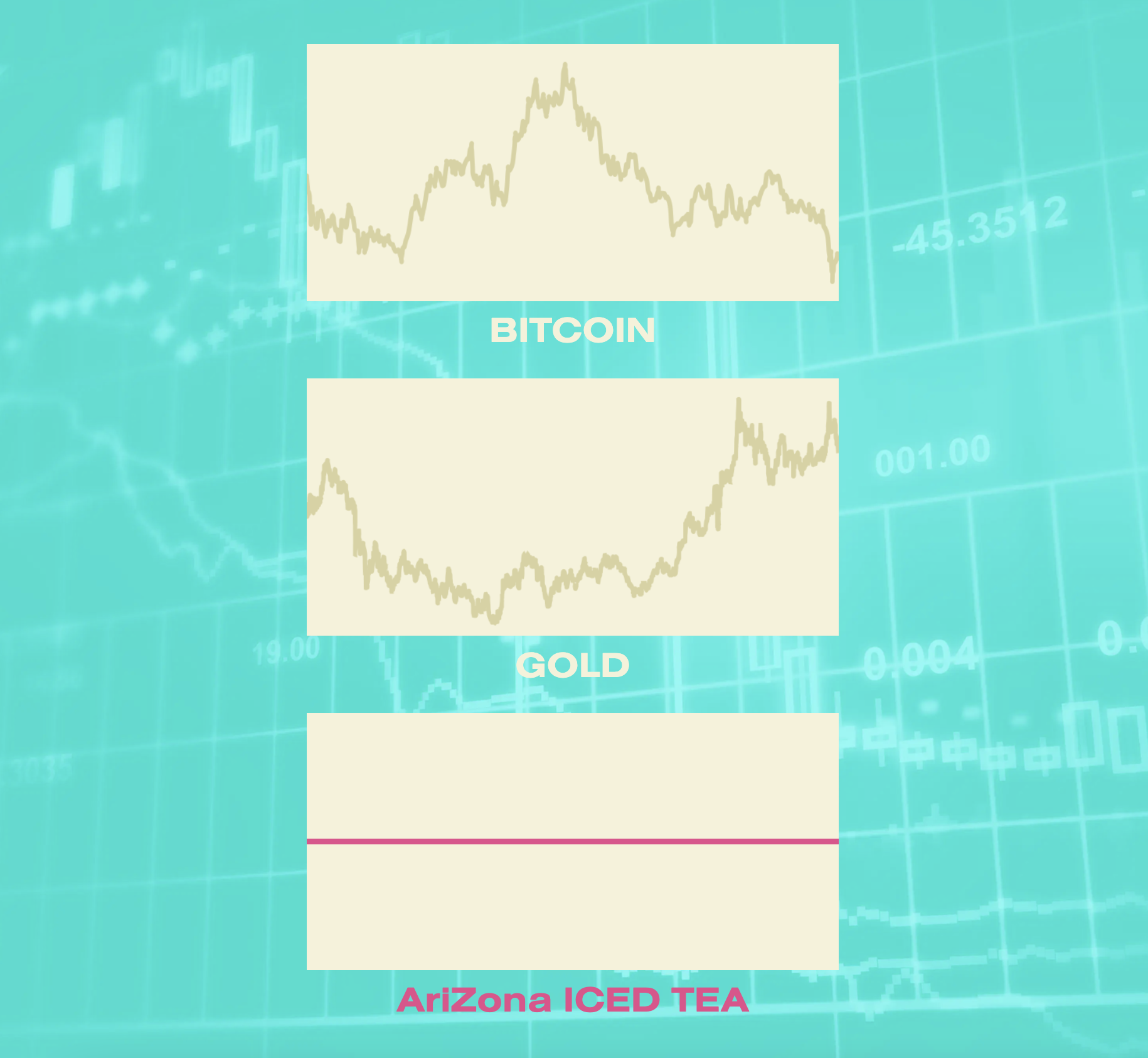ICYMI, stablecoins are in deep shit right now, and the chaos that unfolded this week has thrown the entire crypto ecosystem into turmoil with over $400 billion in losses from just one coin alone. In these times of uncertainty, all we can rely on is that we can purchase a can of AriZona Iced Tea for 99 cents, the same price that the refreshing beverage sold for in 1996. Mossy, a collective of three techy artists, thinks that an (unofficially) AriZona-backed stablecoin can save the crypto economy.
A stablecoin, as the name implies, is supposed to be stable because it tracks the value of another asset — similar to how gold bars once backed the U.S. dollar during gold-standard times.
In the case of TerraUSD (UST), formerly one of the largest stablecoins that fell from grace this week, each UST coin was supposed to stay consistently equivalent in value to one U.S. dollar. But there were no physical reserves — instead, the group behind UST used algorithms and reserves of other cryptocurrencies to manage its price. That system went haywire, leading some holders of UST to withdraw their money, and before investors knew what had hit them, the panic and fear compounded and UST was trading as low as nine cents on the dollar. UST’s sudden collapse has led to over $400 billion in losses for investors over the past week or so, leaving people to question the, well, stability of stablecoins as a whole.
Mossy’s solution for the calamitous sector, a stablecoin called USDTea, is backed by what they claim is America’s most stable asset: cans of AriZona Iced Tea. For over 30 years, AriZona founder Don Vultaggio has been working tirelessly against inflation to keep the cost of each can at exactly 99 cents, playing hardball with suppliers to keep input costs low and sacrificing his own profit for the sake of consistency.
As for Mossy, you may have seen their work before. The group launched the “Non-fungible Olive Gardens” project that got them in some hot water over copyright laws as well as the “Blockedchain” NFTs that only Twitter users who have been blocked by famed (and pugnacious) venture capitalist Marc Andreessen can mint.
Mossy quietly announced the USDTea stablecoin project on Twitter one and a half hours before selling out all 1,000 tokens they initially supplied. We sat down with Brian Moore, one of the three members of the artists’ collective — another member is Mike Lacher, who recently went viral for his AI that harshly judges your music taste, while the third member chooses to remain anonymous. Moore regaled us with his (mostly) straight-faced, highly serious explanation of Mossy’s ambitions to bring stability to an unstable world — one can of iced tea at a time.

Image Credits: USDTea (opens in a new window)
TC: So, who are you? What is this collective that tries to save crypto through AriZona Iced Tea?
BM: We’re a little group called Mossy, and the last three things we’ve made have all been web3 projects. We created non-fungible Olive Gardens, and then we did Blockedchain, which was an NFT series that you can only mint if you’re blocked by specific people on Twitter, like Marc Andreesen. And now the latest is USDTea, which is a stablecoin that’s linked to the most stable asset we know on planet Earth, which is AriZona Iced Tea.
Can you literally connect your wallet to this and get a token?
Well, first of all, I just got word that we are fully out of the 1,000 that we started with [after about an hour and a half post-launch]. That’s the weirdness of this world. It was the same thing with non-fungible Olive Gardens; we quietly released it, and then it was gone within I think 10 hours.
AriZona Iced Tea might be $0.99, but what about gas fees?
The way the flow works is the fees aren’t super high. It’s an ERC 20 token. I bought some and I think it was, you know, negligible, like $4 or something in gas fees. And then, just like any other stablecoins that are pegged to currency, you can always switch back. In this case, you can burn your USDTea and we will ship you cans of AriZona Iced Tea, because it wouldn’t be backed by it if we didn’t actually do that. So we have our strategic reserves of AriZona Iced Tea to use if people want to convert it back at any given time.
Do you actually have 1,000 cans of tea?
It’s 1,000 cans where we’re starting. That might expand in the future. And if we do that, I think we’d probably be open to external auditing depending on the situation, but currently, we’ve got 1,000 cans basically, and we will distribute them as necessary. Right now we do have reserves split around different locations around the U.S.
Do you make these satirical web3 projects as your full-time job?
The more we do this, the more it becomes something that is more full time, but I’d say we’re mostly artists.
How many people are you?
We’re three people. So we’re pretty … I guess the word would be nimble. It allows us to make things very quickly. In the case of the destabilization of currency-pegged cryptocurrencies, you know, when did that whole snafu go down? We’re trying to bolster the crypto economy as quickly as possible, and we can only do that with a small team.

Image Credits: USDTea (opens in a new window)
Did you conceive of this idea last week when Terra was collapsing?
Exactly. There’s something to be said about the stability of stablecoins, right? That’s half the word, stable. And then you think, what’s the most stable thing you can imagine? AriZona Iced Tea, you really can’t beat it.
How do you make money off of this, or is making money not the goal?
It’s not necessarily the goal, really, but I think we want to support ourselves at some point. We’re in the interest of making interesting work on the internet, and that is the ultimate goal. If it makes us money, great, and if it doesn’t, then that’s fine too. Ultimately, we’re just making interesting things — making people think, making people laugh, or, you know, stabilize their assets in canned iced teas.
How would you make money?
These are fungible assets, so it’s meant to be more of a currency replacement than, say, an individual art piece. One USDTea is equal to one USDTea. There’s no one of them that’s better than the other or rarer than the other. They’re all equal to one can of AriZona’s Iced Tea.
But to redeem your can of tea, you have to pay a $20 flat processing fee. What is that fee?
That’s just literally the logistics of shipping. That’s not a money-making scheme to make profit off of the transaction; it’s to get you your personalized tea assets that you can store in your own location.
On your website, you have the question “what happens when ETH crashes?”, and you say that you update the ETH/USDTea to match ETH/USD from time to time. What does that entail?
It just means that as Ethereum might change in price, we want to match that so the rate ends up being around 99 cents.
How often will you do that? I imagine you don’t have an algorithm.
No, there’s no algorithm yet. That might come in the future — it all depends on how wide we expand this. We’re taking it one step at a time. This has been about 90 minutes worth of launch time, so once we stabilize our own situation, we’ll figure out what we need to do.
Obviously, Terra was the inspiration for this project. Do you have any opinions or takes about what happened, and how Terra’s handling that?
I think our company speaks through the work itself. We’re here to try to stabilize an unstable world, so I think that backing our assets in a new, innovative and most importantly stable asset … I think that sort of says all that we need to say about that situation.

An anteater. Image Credits: MICHAL CIZEK/AFP via Getty Images
Would you say you’re bullish or bearish on crypto?
Are we bullish? Are we bearish? I don’t know. I think we’re exploring it. We love it as a medium through which to make interesting art pieces. I don’t think we necessarily have an answer or have an animal to assign to it. You can just say anteater or something like that.

